Moving to Korea can be intimidating – especially if you can’t speak the language or know little about the culture, like I did! But with these helpful tips, your move to South Korea will be a breeze!
I lived and taught English in Daegu, South Korea for two years with the EPIK program, and when I first arrived, I was definitely overwhelmed trying to figure out how life in Korea worked! But within a few months, I started to feel more and more comfortable.
Since I’ve already been there, and done that, I thought I’d pay it forward or those first moving to Korea. I’ve learned the hard way what it takes to get settled into the life of an expat in Korea so you don’t have to!
Here is everything I wish I’d known before moving to Korea including a step by step guide for how to move to Korea, the process once you arrive, and the little life hacks to help you get settled!
↠ Read More: What It’s Like Living in Daegu, South Korea
This post may contain affiliate links, meaning at no additional cost to you, if you click my links and make a purchase, I may earn a small commission. Learn more on my disclosure page. Thank you for your support!

The colorful Gamcheon Culture Village in Busan
How to Move to South Korea: The Complete Checklist
This step by step guide is an ultimate moving to South Korea Checklist that covers all you need to know.
If you already have secured a job and a visa for Korea, you’ll probably want can skip the first few steps of this checklist. #1 and #2 are for those wondering – “How can I move to Korea?”
1. Pick a Visa Route + Apply to Jobs/Programs
Teach English in South Korea
One of the best/easiest ways to move to Korea (for native English speakers) is by finding a job teaching English with EPIK or a private academy. In South Korea, the teaching English industry is in high demand, which means there are many job opportunities for aspiring teachers.
To qualify to teach English, you must meet a few key requirements, the most important being you must have:
- A Bachelor’s degree
- Citizenship from the US, UK, Australia, New Zealand, Canada, South Africa, Ireland, and India (with proof of English ability)
- A TEFL Certificate
↠ Read More: How to Teach English in Korea
Korea’s Working Holiday Visa
Unfortunately, in order to qualify for a teaching visa in South Korea, you must hold citizenship from a small list of countries. However, South Korea offers a Working Holiday Visa that is available to a wide range of countries, and does not require native English ability.
The Working Holiday Visa, also known as H-1, allows for participants to live and work part-time in Korea for up to 12 months, or 18 for US citizens. While it allows people to work, there are certain jobs that are not permitted under the visa such as teaching English, professions that require special licenses (ex doctor or lawyer), journalism, etc.
There are currently 25 countries eligible for this visa, including places in Europe like Denmark, Belgium, Austria etc, places in South America (Chile and Argentina), and other Asian countries (Japan, Taiwan etc.).
Study Abroad in Korea
Another way to move to Korea is by studying abroad. There are many It’s also possible to study programs taught in English in Korea and also language programs where you can go to learn Korean specifically.
Korea’s primary student visa is also known as the D-2, but there are other visa types that allow for studying that may fit your specific needs better.

One of my English camps with the EPIK program!
2. Apply for your Korean Visa in your home country
Before moving to South Korea, you’ll most likely need to apply for your visa at the Korean embassy in your home country. The specific visa you need will determine the application process, but the main requirements are all someone similar.
Korea usually wants to see that you have a clean background with an FBI check, a passport that has an expiration date at least six months prior to the end of your stay in Korea, a medical check proving no TB, proof of education, and all other relevant documents. You’ll also need passport photos, an application form and fee.
To find the best Korean visa for you and all it entails, be sure to research or reach out to your nearest embassy directly. When I applied for my visa, I had to mail in my passport to the embassy, and I got it back with my visa in less than a month.
3. Gather your documents, pack your bags and fly to Korea!
Once you have your visa in hand, you’re ready to fly to Korea! Here are some recommended documents to bring with you.
Documents to Bring to Korea
- Korean Tax Exempt Letter if working and from the US, UK, SA, Aus, and NZ
- Original TEFL certificate + Copy of TEFL certificate
- Copy of birth certificate
- Passport photos
- Copies of passport
- International Driver’s License
Packing Tips for South Korea
If you’re going nuts trying to decide what to pack for Korea, I’ve got you. I go into deeper detail for what I recommend in my Korea packing guide, but here are some quick tips.
- If your skin tone is even slightly darker than the industry’s three lightest shades, stock up. Korean makeup stores typically only stock lighter shades. Larger stores in Seoul may carry more options, but you should come prepared with your faves.
- If you wear clothes larger than a woman’s size 8, or wear larger shoes (bigger than women’s size 8) come prepared with solid basics. Men’s clothing and shoe options tend to go into the higher sizes, but not much past the “middle” sizes.
- Pack speciality holiday supplies if you’re die hard about certain holidays that aren’t celebrated in Korea. Americans may want to bring stuffing and canned pumpkin for Thanksgiving, Brits may want to bring mince pie filling, etc. Obvi not essential, but I had friends who brought these things!!
- Four season apparel – it gets cold and a little snowy in the winter, and very hot in the summer
It’s certainly possible to find all of the above things in Korea, however it can be difficult or the options are limited. Online shopping in Korea is also pretty on point, opening up the possibilities for more options.
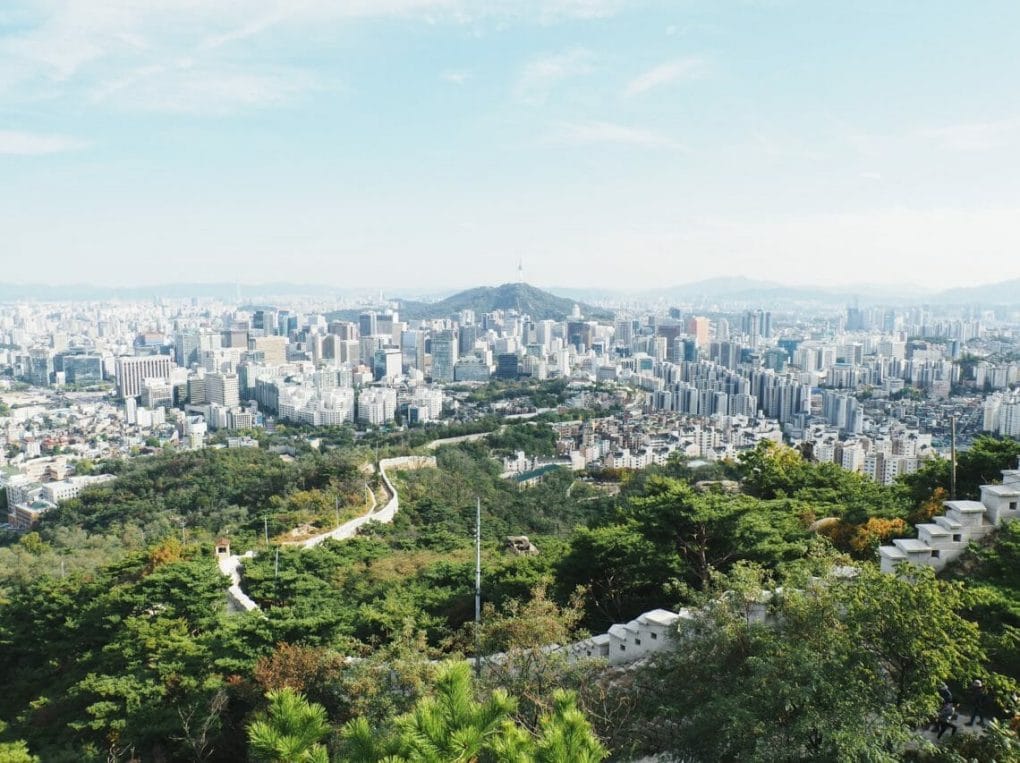
4. Find a Place to Live in Korea
Up next, you gotta find a place to live! If you’re coming to Korea to teach English, chances are your school already took care of it for you. That is one of the biggest perks of teaching with EPIK for example.
Finding an apartment in Korea is a bit different than many Western countries, simply because things move fast. Not only that, but in Korea the deposit fee, called “Key Money”, is usually a lot more than you may be accustomed to. It is sometimes as much as a full year of rent.
You can find apartments via local Korean realtors (probably the easiest way) or with apps like jikbang (직방) or dabang (다방) or even on Craigslist. Read more about finding an apartment in Korea for more in-depth info.
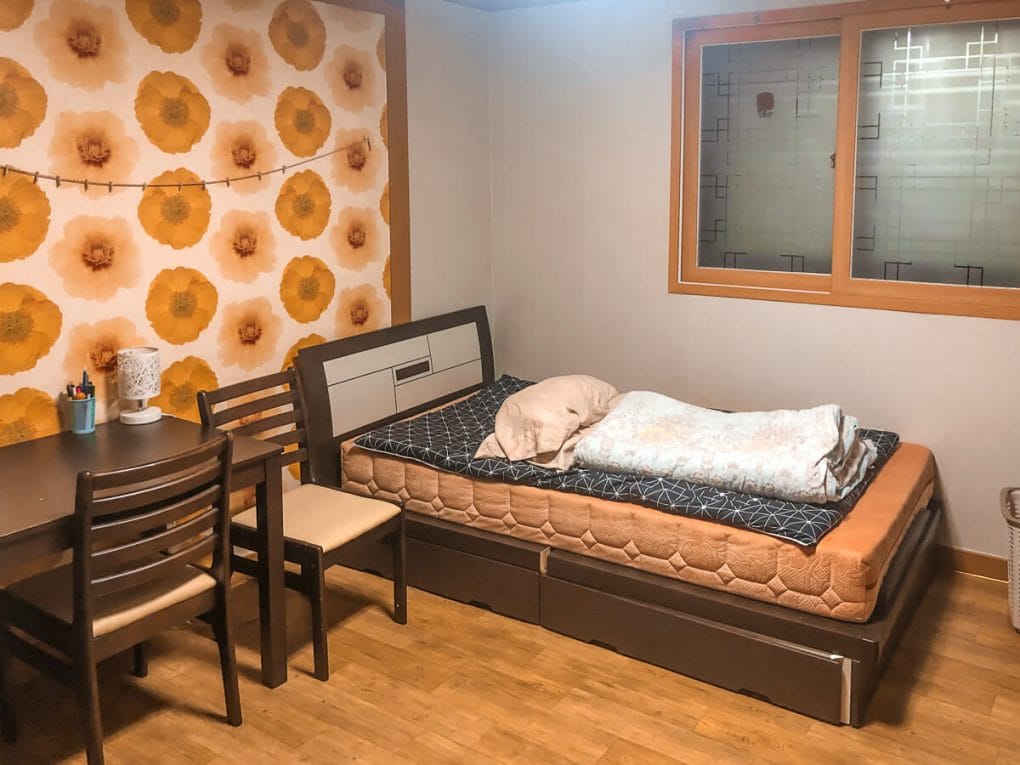
My simple studio apartment. It wasn’t much, but it was home (and free!)
5. Get Your ARC Card
In Korea, all new expats in Korea must apply for an ARC, or their Alien Registration Card at the local immigration office. It’s an identification card that asserts you have a legal residence in Korea.
You can apply for it as soon as you have your required documentation, which is usually once you have an apartment. You’ll need to bring two passport photos, your passport details, your EPIK contract (or proof of employment) and your lease. You’ll also need to fill out an application when you arrive and pay a 30,000 won fee.
The immigration office can mail it to your school or apartment when it’s finished, but you’ll need to sign for it so be sure it’s sent to a location you’ll be at. You’ll need this ARC card to open a bank account and set up a phone plan.
6. Get a SIM Card or Phone Plan
There are many different ways you can go about your phone plan in Korea.
- Temporary sim card: When you first arrive in Korea, you must have your ARC card before you can set up your long-term phone plan. For that first month or so, you can use an EG Sim Card to stay connected.
- Long term phone plan options:
- Pay as you go: Visit any major phone retailer like Olleh or T-World to purchase a sim card that you can top up with data as you go. 1GB of data should cost you about 14,300 won, and calls and texts are deducted from your total balance.
- Portable WiFi egg: You can purchase a portable WiFi device that you pay for data on a monthly basis. A good option for those who don’t have WiFi included at home and who are looking to save on a year contract, but you do need to carry an additional device around with you for data.
- 1 year contract: There are many different plan options with varying prices, but I pay about 52,000 won a month for 10GB fast data + unlimited data at reduced speeds and call and text. Since I travel around the country often, I love the convenience of a lot of data.
- 2 year contract: You can get slightly discounted rates in comparison to the 1 year contract if you’re planning on staying more than 1 year.
- Cheap smartphones: Many expats come to Korea with the intention of buying a new smartphone while they’re here. If it’s not an iPhone, they’re pretty affordable. Just be warned that all phones in Korea must make the camera shutter sound regardless of when in silent mode (to combat the voyeurism problem women have faced in Korea).

6. Set up a Bank Account
Dealing with finances in Korea can be a bit of a challenge if you don’t speak Korean, and opening a bank account is a bit of a process by American standards.
To open a bank account in Korea, you’ll need to go in person and have with you your ARC card, passport with visa, proof of employment, and a phone number. I recommend asking a Korean friend or co-worker to go with you, as it’ll help make the process easier.
Some quick tips and recommendations when opening a bank account in Korea:
- Be sure to sign up for internet banking at the time of account opening. You’ll need an internet security certificate installed on your phone to be able to access your account on a banking app, and you’ll need this security certificate for transfers home while here and after you leave. Future you will be grateful.
- Have your debit card set up as your public transportation card when opening your bank account. Many banks offer this service, but you need a special debit card for it to work. That way you’ll need to carry one less card, your fare will automatically be deducted from your bank account once a month, and you won’t have to worry about continuously topping up a T Money or bus and metro card. I had to pay a 30,000 won deposit for a debit card that doubled as a transportation card at KB bank.
- Set up your debit card to be global so you can use your Korean debit card abroad. Typically foreigners get debit cards that can only be used in Korea unless otherwise requested, so make sure you do so on your first visit to the bank to avoid having to come back.
- Bank through KB or KEB if you can help it.
- KEB has an easy international transfers account and is open Sundays at their international branch in Daegu.
- KB bank also has an easy international transfer you can do from their phone app.
- Bring a credit card from home if you can for those instances when your Korean card won’t work, because trust me there are instances where it feels impossible to buy something with it. I recommend a credit card without foreign transaction fees, like the Chase Sapphire Preferred.
↠ Read More: How to Pay Student Loans in South Korea

You can’t beat the hiking in Korea. Can you spot me? 😉
8. Get a bus card and learn how to use public transportation in Korea
If you were unable to get your debit card set up as a bus card, or you just want to have an extra one because honestly they are cheap and useful, you have a few options. The two most popular bus cards in Korea are the T-Money and CashBee cards, and they provide discounted rates compared with the cash rate.
You can purchase these cards usually for about 4,000 won at any convenience store. You must also top off these cards with funds before you can ride the metro or bus. To top off, you simply pay with cash (they don’t accept debit cards usually) at the convenience store.
Here are some tips for how to use transport cards in Korea:
- T-Money and CashBee cards can be used on buses and metros in most cities including Seoul, Daegu, Busan, Daejeon, Incheon etc. Be sure to check before going to a smaller city.
- Every city in Korea has their own network transport which means different fees and ways of getting on and off depending where you are.
- Busan and Daegu: Always tap your card when you enter the bus, and tap off when you need to transfer to a different bus or metro (you have 30 minutes to transfer for free when switching to a different route). You do NOT need to tap off at the end of your journey.
- Seoul: Always tap your card when you enter the bus, and tap off when you need to transfer to a different bus or metro (you have 30 minutes to transfer for free when switching to a different route). You DO need to tap off at the end of your journey, as the fare is calculated by distance. If you forget to tap off, they may charge you for the full distance of the route.
For route planning, you can use Korean navigation apps like KakaoMap or Naver. Google Maps sometimes shows accurate public transportation routes, but you can trust the other two more. Plus Google Maps does not work for any other navigation in Korea so it’s not worth even having it.
You can also check the city’s local bus website for more info: Daegu Bus, Busan Bus, Seoul Info
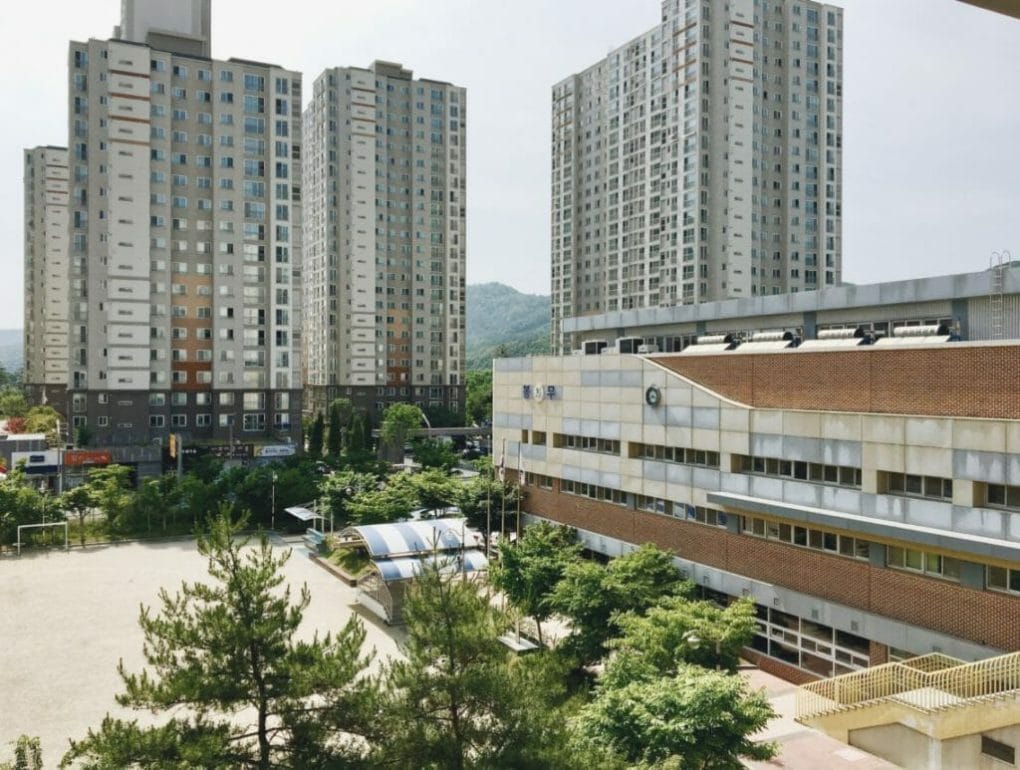
My elementary school in Daegu surrounded by high-rise apartments
Other Helpful Tips for Moving to Korea
Cost of Living in Korea
This question is largely dependent on your lifestyle and where you live, but ultimately most find the cost of living in Korea to be quite affordable. Budget-focused people like myself, can live comfortably on about $10,000/year (if your job provides housing for free) or about $16,000+/year (including rent) to live in Korea.
If you live in Seoul, love to shop, or treat yourself to Western goodies and frequent dining out, you’ll probably find your living expenses to be much more. You can check out more info in my detailed cost of living guide linked below.
↠ Read More: The Average Cost of Living in Korea for Expats
The Best Apps in Korea
When you live and travel around Korea, having these apps downloaded on your phone will make your life easier.
- Yogiyo: This is Korea’s food delivery app. It’s only in Korean so you’ll need to figure out how to set up an account and what the buttons mean, but once you have it down it’s easy. Check out this YouTube tutorial to help you learn how to use it the first time.
- KakaoTaxi: This is the Uber of Korea (because Uber doesn’t exist here). It’s super easy to use and they actually just updated it to include an English version – yippie! Use it to call a taxi whenever you’re in need and expect to be picked up pretty quickly.
- KakaoMaps/Naver Maps: These are Korea’s GoogleMap apps. They are both only in Korean but they are very useful and much more accurate than Google when it comes to navigation around Korea. They even show the bus routes and bus stop information! I like KakaoMaps much more than Naver personally but it’s good to have options.
- Google Maps: Google Maps only works for public transportation, but not for driving or walking navigation. Google has been restricted to provide such services in Korea for supposed security reasons.
- Kakaotalk: KakaoTalk is the main messaging app and actually has a lot of cool features that Whatsapp doesn’t have! Not to mention super cute emojis.
- Papago / Google Translate: These are going to come in handy in your day-to-day life. Papago is actually made in Korea and is pretty accurate. You can use your phone’s microphone to listen and translate speech as well as translate written text. Google Translate has a feature that allows you to take a photo of the written text and translate directly from the photo – perfect for ordering meals at restaurants.
- Plume or AirVisual: The air pollution in Korea can be high at times, so it’s nice to have an app that can warn you of especially high levels. Use it to stay informed and be cautious of outdoor activities.
- Dating Apps:
- Tinder: Tinder isn’t the most popular dating app in Korea, but people do use it. It’s the same as at home (a place to find hookups), but Koreans use it sometimes for language exchange with foreigners.
- HelloTalk: This app is technically for language exchange, but many Koreans also use it to meet hookups. You can’t filter who talks to you, so expect lots of messages looking for everything under the sun.
- Paktor: Another way to interact with locals, this one seems to garner a lot of likes from singles in your area but low chat requests.
↠ Read More: What It’s Like Dating in Korea as a Foreigner
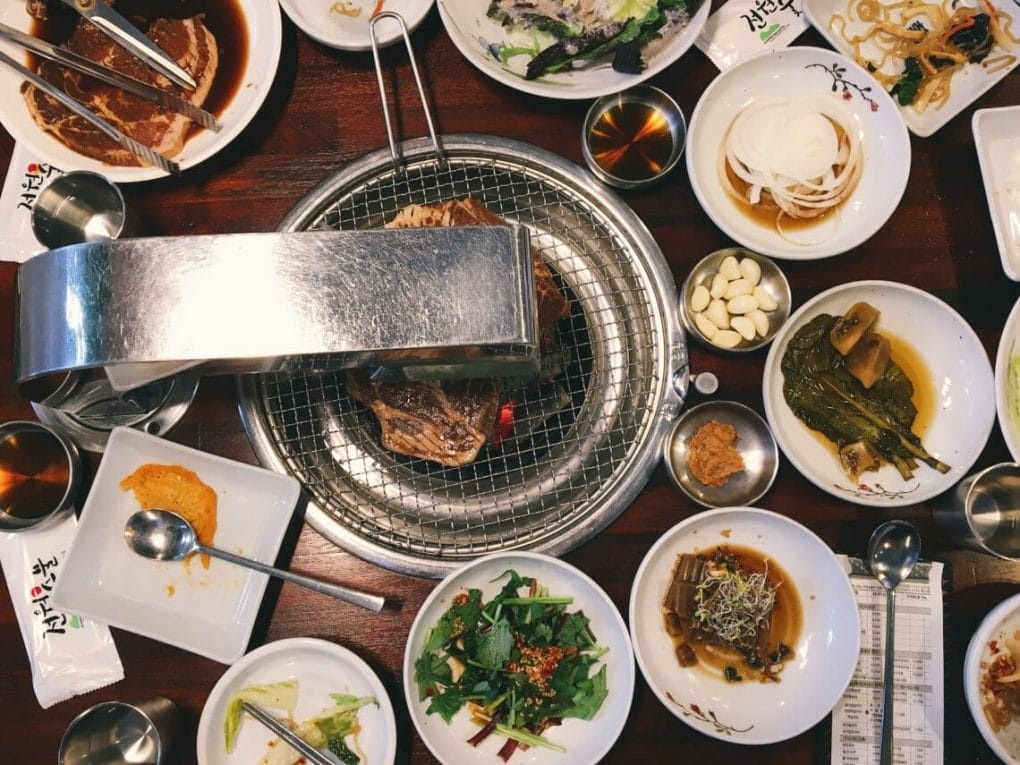
Delicious K-BBQ
Tips for Getting Around Korea
Traveling around the country could honestly not be any easier. There are so many options for folks looking to get out of the city, and once you learn how public transportation works you’ll be traveling around Korea like a pro.
Renting a Car in Korea
Renting a car and driving around Korea is super convenient. Be sure to bring your International Driver’s Permit from home before moving abroad. Here people drive on the right side and use automatic cars so it’s an easy transition for Americans. Lotte Car Rental offers affordable rental prices and their website is in English.
National Trains and Buses
Korea is pretty well connected by national trains known as the KTX, SRT, Mugunghwa-ho slow train as well as national buses. These networks are different from the local city buses and trains, and you have to purchase a ticket to use them, you cannot use your T-Money, CashBee or other bus card.
Some tips:
- You can buy train tickets a month in advance. Some busy weekends do sell out, so take care to buy your ticket early.
- You can purchase tickets and check the timetable for the trains (KTX website) and buses (Kobus website) online.
- Train departure and arrival times are quite strict and they wait for no one. Be there on time or risk missing your train!
- There is an overnight bus directly to Incheon airport from Dongdaegu station for when you have an early morning flight out of Seoul. Take the night bus to avoid having to pay for accommodation in Seoul the night before your trip. Check out the timetable on the Bustago website. You can view the timetable on their English site but you’ll need to purchase it on the Korean site.
↠ Read More: How to Buy Bus Tickets in Korea

Going to the Doctor in Korea / Healthcare in Korea
Under our working visas, teachers are enrolled in the Korean national health insurance. Take the time to learn the details of your benefits because they’re actually pretty great! And since it’s mandatory, you may as well use it.
- Dentist: Our dental coverage includes two cleanings a year for a deductible of about 14,000 won. Braces and wisdom teeth extraction may also be significantly cheaper than American standards, so good to consider while you’re here.
- Gynecologist: Under the national health insurance, women receive one free pap smear a year for about 10,000 won. Birth control options like the pill and IUD are fairly easy to obtain here as well.
- Doctor: We’re also eligible for cheap prescriptions and cheap visits to the doctor. Keep in mind Koreans call all clinics ‘hospitals’, and they’re on nearly every corner. Since medical care is so cheap here, don’t be surprised if your co-workers suggest you visit the hospital for every little illness.
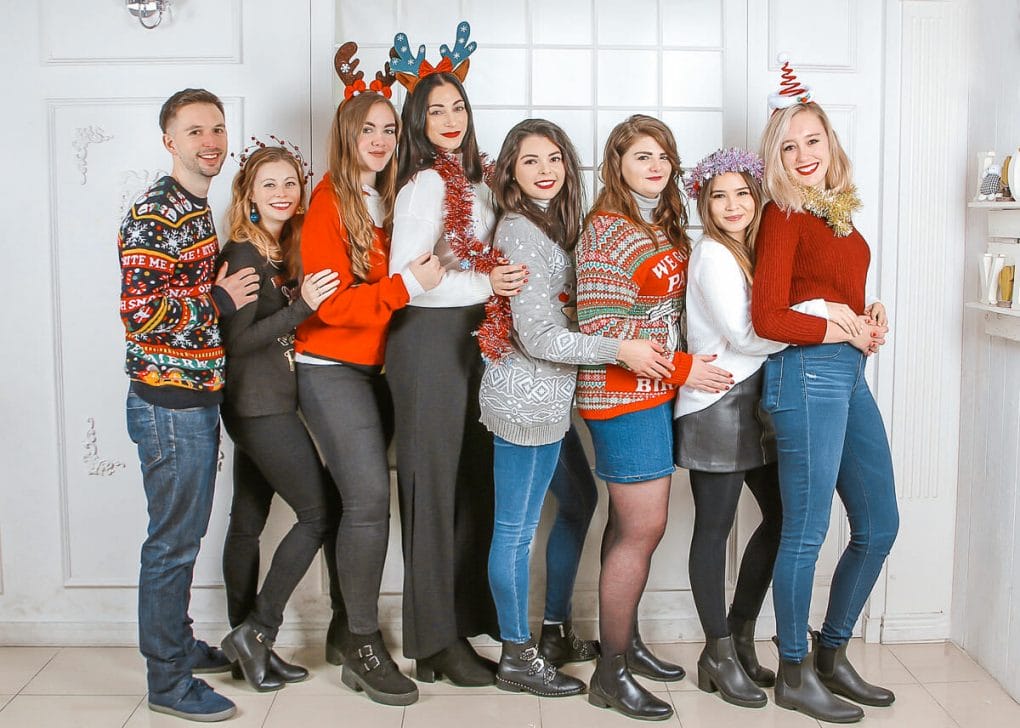
How to Meet People in Korea
The expat community is quite vast in South Korea. With the large American military presence around the country and the many private academies and public schools hiring English teachers, there are so many extremely helpful social platforms and resources for English speakers to use.
Join Facebook Groups
- Restaurant Buzz Seoul: A food community for Seoul.
- Women of Daegu: Specifically for women sharing tips for other women in Daegu
- Every Expat in Korea: Open to all in Korea
Take a Korean Class
- If you’re an EPIK teacher, your department of Education may offer free Korean classes each semester, I know the DMOE in Daegu did. Talk to your co-teacher for more information.
- YMCA offers affordable Korean language classes, once or twice a week for a semester, usually no more than $150 for the entire course
- Participate in Language Exchanges
Join a Sports League or club
- Ayurveda Yoga Studio and Daegu Fight Club are two great organizations in Daegu
- ROK Ultimate Frisbee
Volunteer in Korea
- Liberty for North Korea: Volunteer to raise funds to help North Korean refugees begin their new lives.
- TNKR (Teach North Korean Refugees): This is an NGO based in Seoul where volunteers are matched with a North Korean refugee to help assist with numerous things. Best if you live in Seoul or visit frequently.
- Hannah’s Animal Shelter in Daegu
Go on an organized tour with other Expats
There are English tour groups you can take advantage of. Enjoy Korea and Wink are two of the big ones. IMHO you can have more fun and freedom if you travel around the country yourself, but when you first move here and are settling into your new life in Daegu, these tour groups are great options for English speakers.
↠Read More: Everything You Need to Know about Korean Food
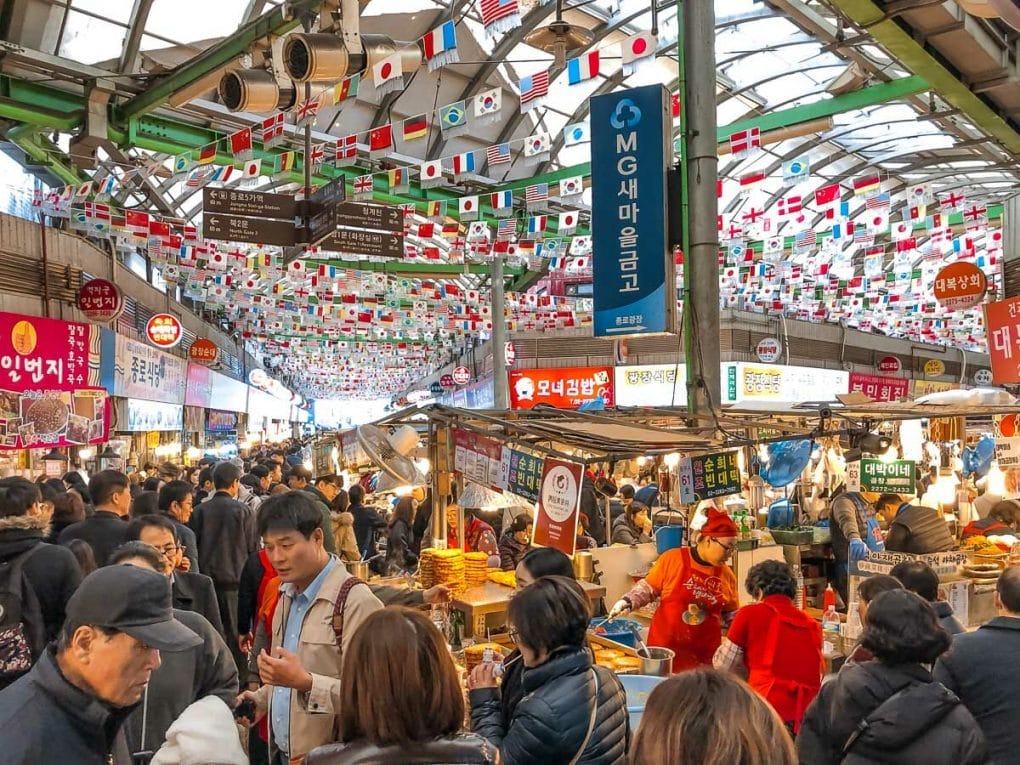
Gwangjang Traditional Market – stop for the Mungbean Pancake and Mandu Soup!
Tips for Shopping in Korea
Here is a quick run down of the best shopping and stores in Korea for pretty much all of your living needs!
- Daiso is a great store for all of your random household items. It’s very cheap and affordable and sells kitchen supplies, random home goods, cleaning supplies, small snacks, stationery, holiday decorations and other misc items.
- Homeplus, Costco and Emart are the largest home goods and grocery stores in Korea, and they are closed the 2nd and 4th Sunday of the month to help small and local businesses.
- If you have a Costco membership from home, bring it along! It’s valid here. If you don’t have one but have been considering getting one, get it in Korea because it’s cheaper than at home.
- Gmarket, Coupang and iherb are great websites for specialty items that you can’t find in stores.
- The local traditional markets have the cheapest fruit and vegetables.
- Asos and Amazon deliver to Korea for free or a low shipping fee when you’re in need of Western-sized clothing or western goodies.
- There are Korean Groupon websites you can take advantage of for cheap deals, but they’re sadly only in Korean. Ask your Korean friends for assistance if you’re looking for a good deal.
↠Read More: 25 Best Things to Buy in South Korea
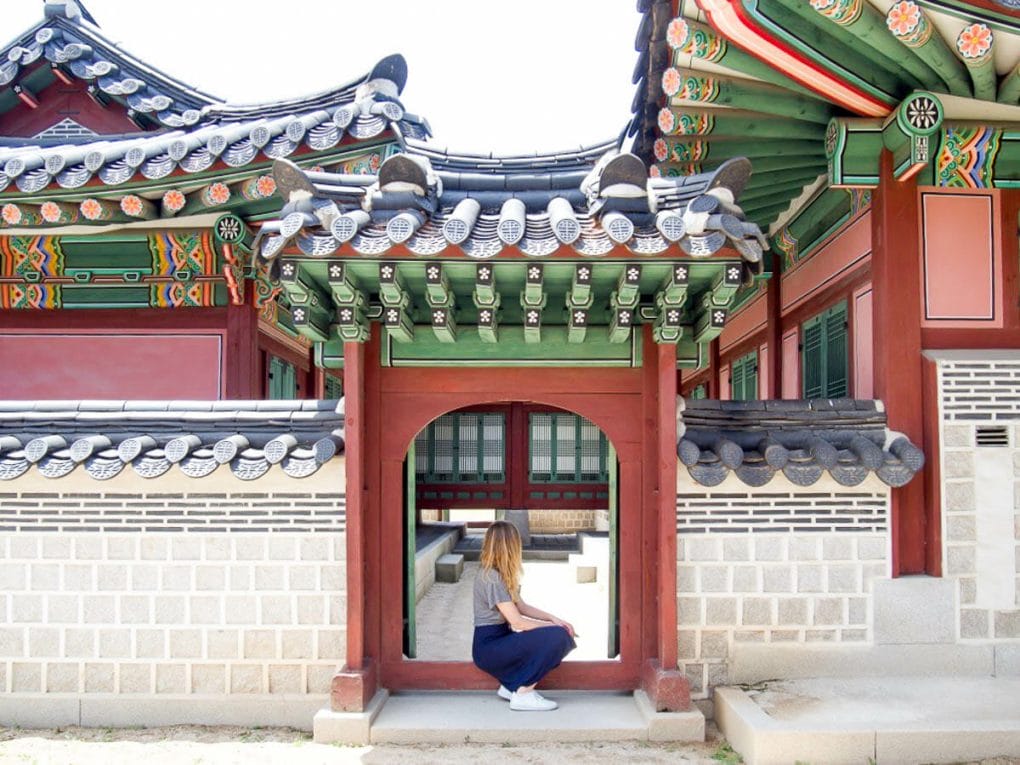
Miscellaneous Tips for Moving to Korea
Here is just a dump of even more tips you may find helpful when planning a move to Korea.
- Move-in apartment cleaning: When you first move in, hire professionals to come and deep clean your entire apartment. It’s actually pretty affordable and may be worth it if the previous tenant was a slob (trust me, I’ve heard some horror stories). Expect to pay around 40,000 – 60,000 won. You’ll want to ask a Korean for assistance if you don’t speak the language.
- With your ARC, you can get a library card and most libraries have an English section.
- Waygook and Korshare are platforms for local English teachers to share their lesson plans and activities. Waygook is the original website that has recently begun to charge a small fee to use ($20/year), but KorShare was created in 2017 and is free.
- You can check out bikes for free at many metro stations on the red and green line in Daegu. Just register as a member at the information desk.
- Get cheap movie tickets the last Wednesday of every month at CGV and Lotte cinemas.
- Call 1330 for tourist information in English and for any random thing you need a Korean speaker to help with.
↠ Read More: A Leaving Korea Checklist for English Teachers
Phew that was a lot of information in one post! I hope you found this guide for moving to South Korea helpful. If you have any other tips you’d like to share, or any questions and comments, please share below 🙂
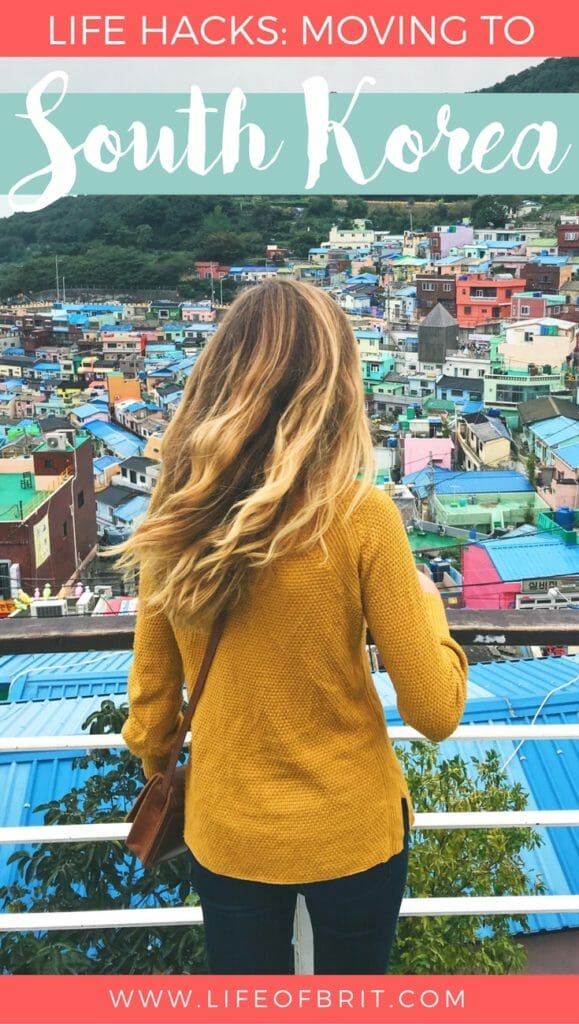

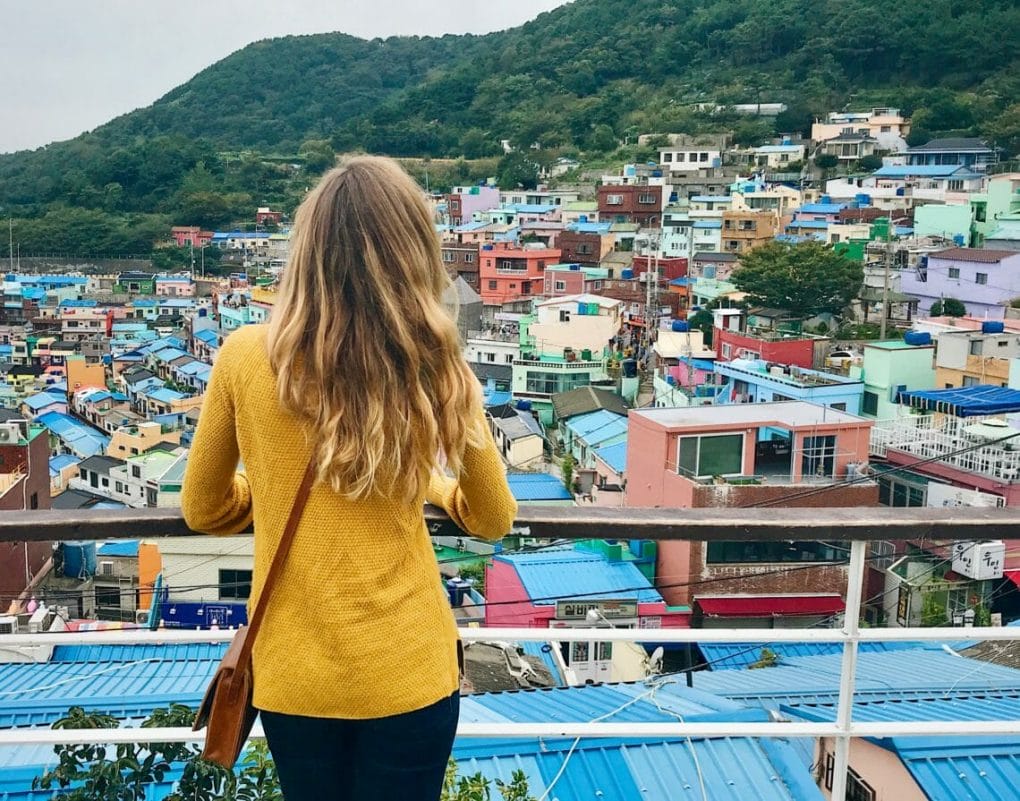

Wow. That is a lot of information. Very useful. I hope one day to visit Korea!
Moving to Korea can seem very overwhelming, but I think once you do it you’re going to love it! Anything I can help you with, please let me know! Maybe finding a suitable lamp shop or furniture store
perhaps?
Hey Brit! What did you do about a VPN in South Korea (to access American Netflix for example)?
I actually decided not to get a VPN! The Netflix in Korea seems to offer many of the same things as the American (but it could be I just don’t know what I’m missing haha), and I use Apple Music for my online music streaming which also is no issue!
BUT – my friend has one through Express VPN and he’s been very happy with it. I believe he paid about $100 for the year, has had a great experience with their customer service and he has the ability to use it on his phone and laptop while choosing whichever country he wants to be in. You could check it out and see if it’s a good fit for you!
Can I just start by saying THANK YOU! I just found your blog and it is really helpful as I am applying to EPIK for the Fall.
I am interested in living in Daegu and I was wondering if you could talk a little bit about how you felt about Daegu?
You have many posts about it but would you mind discussing overall what you liked about it?
I’m torn with trying to pick a place. Obviously, I would love Seoul like everyone else but realistically I am considering Daegu as my first choice instead.
Hi Ash! I’m so happy you’ve found my blog helpful and I’m so excited you’ve decided to apply to EPIK! It’s such a great program and this past year has really been incredible.
What I like about Daegu:
– I like that it’s still a large city so there are plenty of amazing restaurants, clubs, and activities to do here (like great hiking, which for me is a major plus).
– With EPIK, the number of teachers hired to Daegu is high compared to other places. So at orientation there were 60 or so other new English teachers to befriend whereas for other more rural places the intake was maybe 20 or 10 people or less. I’ve met a big group of people I enjoy spending time with and we have a lot of fun doing group things together.
– Daegu is also centrally located in the country making travel to Busan, Seoul and other parts of the country fairly easy.
– There’s really great public transportation, subway system, KTX station, tons of local buses
What I dislike about Daegu:
– I don’t actually live in downtown Daegu, I’m more rural and about a 30-40 min bus ride away from downtown as I think most teachers are. It’s not a deal breaker, but thought I’d share with you!
– Daegu is also one of the most conservative cities in Korea, so the atmosphere is a little bit different from Seoul, but I think it’s definitely changing.
– Koreans can be shy about speaking with foreigners here and the art scene is kind of lacking a bit.
– Daegu is the hottest city in the Korea and was at times unbearable in the summer but as we work 40 hours a week anyways, we were indoors so the heat was manageable haha!
I’m not sure what kind of TEFL certification you have, but if you have enough in-class hours you could also consider Busan. It’s a bigger city than Daegu, is located on the coast and has a different atmosphere than Daegu. Many people choose Busan as their second choice! I didn’t have the hours but ultimately I’m very happy with how everything worked out for me in Daegu! 🙂
This is a lot of information (sorry I tend to overshare LOL) I hope this helps!
Hi! I was scrolling through Pinterest and saw your post and had to click on it because I also used to teach in Daegu! I was there from March 2013-14, and I loved it! I wouldn’t be surprised if we know some of the same people haha. This is a great post– it would have been so useful for me 5 years ago when I moved to Daegu!
Hi Emily! Thank you so much for your kind words!! It’s so cool you taught in Daegu as well – such a small world ☺️ It really is an underrated place!
Howya, thanks so much for all the interesting info, tips, and experiences! I’m from Ireland, will be going to Chuongbuk-do shortly for \EPIK Nervous and excited both! One thing is, I love hiking, the farther and steeper the better for me! Are you still in Korea?
My pleasure! I hope you find them helpful!! I’m also really into hiking and Korea has a lot of great mountains to explore. There aren’t any especially tall mountains in Korea compared to other places (nothing higher than 2,000 meters), but interesting nonetheless. Yes I am still living and teaching in Korea! I will be here until February 🙂
Thank you so much Brit! I kinda ‘stumbled’ on your blog during my research of S Korea. I am currently teaching in Saigon and am looking to move to S Korea with EPIK next year. I only had Seoul in mind but after doing some more research (and reading your super informative blog!) I think Daegu sounds amazing. Thank you! 😉
Thank you for your kind words Annette!! I’m so happy to help!! Seoul is always the dream but with EPIK Daegu has treated me well ???? Anything else I can help with specifically please feel free to email me directly!
I found this extremely helpful since I am preparing to move to Daegu in a couple of weeks! I’ll probably refer to this post regularly when I get there. XD Thank you so much for this post!
I’m so happy to hear it!!! Congrats on your big move to Daegu!! Maybe we’ll run into each other on foreigner street :p
Haha yeah, maybe we will! 😀
Hi Brit,
I’m so happy you posted this. I will arrive in Daegu around early December. If you have learned anything else new about Daegu, please share!! 🙂
I’m glad you found it helpful!! You’re going to have a great time in Daegu! If you have any specific questions, feel free to reach out and email me directly 😀
Can I just say a HUGE thank you for your blog, it’s so incredibly in depth and helpful for EPIK teachers who are currently preparing to take this huge step. I’m going through the the process for the 2020 Fall Intake and my first choice is Daegu, as a Londoner I feel that Seoul could mirror many of the big city pet-peeves I have and like you, I LOVE the mountains and the outdoors and this is sometimes difficult at home surrounded by black cabs and tall buildings 24/7. Although I haven’t been accepted yet and I’m awaiting my final interview, your blog has got me so so excited to move abroad. I was worried about putting Daegu down as I was nervous it wouldn’t offer the same experience as cities like Seoul and Busan where the expat community is bigger, but this has honestly reassured all my worries and doubts. Also a jjimjilbang scrub sounds DIVINE. Sign me up!!
Awe YAY!!! You’ve seriously put a huge smile on my face!!! Thank you for your kind words and I’m super glad you’ve found my blog helpful!! When i first was applying to EPIK I was so frustrated at the lack of online resources – so I wanted to share them myself!! 😝 I hope you love your time in Daegu!! And get to see much of the beauty of Korea ❤️ Send me a DM if you have any questions!! Xx